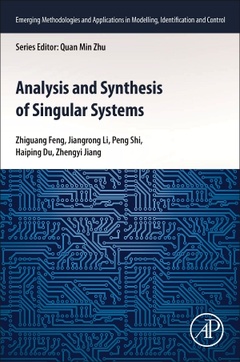Description
Analysis and Synthesis of Singular Systems
Emerging Methodologies and Applications in Modelling, Identification and Control Series
Authors: Feng Zhiguang, Li Jiangrong, Shi Peng, Du Haiping, Jiang Zhengyi
Language: English
Subjects for Analysis and Synthesis of Singular Systems:
125.75 €
In Print (Delivery period: 14 days).
Add to cart262 p. · 15x22.8 cm · Paperback
Description
/li>Contents
/li>Biography
/li>Comment
/li>
Analysis and Synthesis of Singular Systems provides a base for further theoretical research and a design guide for engineering applications of singular systems. The book presents recent advances in analysis and synthesis problems, including state-feedback control, static output feedback control, filtering, dissipative control, H8 control, reliable control, sliding mode control and fuzzy control for linear singular systems and nonlinear singular systems. Less conservative and fresh novel techniques, combined with the linear matrix inequality (LMI) technique, the slack matrix method, and the reciprocally convex combination approach are applied to singular systems.
This book will be of interest to academic researchers, postgraduate and undergraduate students working in control theory and singular systems.
1. Introduction 2. Dissipative Control and Filtering of Singular Systems 3. H8 Control with Transients for Singular Systems 4. Delay-dependent Admissibility and H8 Control of Discrete Singular Delay Systems 5. Delay-dependent Dissipativity Analysis and Synthesis of Singular Delay Systems 6. State-feedback Control for Singular Markovian Systems 7. Sliding Mode Control of Singular Stochastic Markov Jump Systems 8. Admissibility and Admissibilization for Fuzzy Singular Systems
He was a Research Associate in the Department of Mechanical Engineering, University of Hong Kong, Hong Kong, from Oct. 2013 to Feb. 2014. From Mar. 2014 to Apr. 2015, he was a visiting fellow in the School of Computing, Engineering and Mathematics, University of Western Sydney, Australia. He was appointed with Victoria University in Australia as Postdoctoral Research Fellow within the College of Engineering and Science from Oct. 2015 to Mar. 2017.
Jiangrong Li received the B.S degree in Mathematics from Shaanxi Normal University, Xi’an, China, in 2002, and the M.S degree in Operational Research and Cybernetics and the PhD degree in the Applied Mathematics from Xi’dian University, Xi’an, China, in 2006 and 2012, respectively. From 2017 to 2018, she was a Visiting Fellow with the College of Engineering and Science, Victoria University, Australia.
Peng Shi (M-95/SM-98/F-15) received the PhD degree in Electrical Engineering from the University of Newcastle, Australia in 1994; the PhD degree in Mathematics from the University of South Australia in 1998. He was awarded the Doctor of Science degree from the University of Glamorgan, UK in 2006, and the Doctor of Engineering degree from the University of Adelaide in 2015.
Haiping Du has more than 15-year experience on the area of modelling, dynamics and control of electrified vehicles. Dr Du received his PhD degree in mechanical design and theory from Shanghai Jiao Tong University, Shanghai, PR China, in 2002. Previously, Dr Du worked as Research Fellow in University of Technology, Sydney and as Post-Doctoral Research Associate in Imperial College London and the University of Hong Kon
- Discusses recent advances in analysis and synthesis problems for linear singular systems and nonlinear singular systems
- Offers a base for further theoretical research as well as a design guide for engineering applications of singular systems
- Presents several necessary and sufficient conditions for delay-free singular systems and some less conservative results for time-delay singular systems




